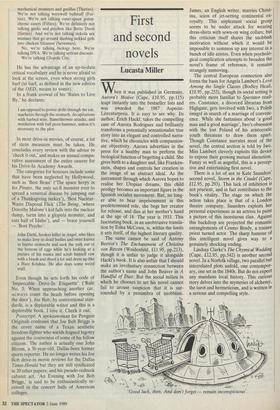First and second novels
Lucasta Miller
hen it was published in Germany, Aurora's Motive (Cape, £10.95, pp.115) leapt instantly into the bestseller lists and was awarded the 1987 Aspecte- Literaturpreis. It is easy to see why. Its author, Erich Hack!, takes the compelling case of Aurora Rodriguez and brilliantly transforms a potentially sensationalist true story into an elegant and controlled narra- tive, which he chronicles with compassion- ate objectivity. Aurora advertises in the press for a healthy man to perform the biological function of begetting a child. She gives birth to a daughter and, like Franken- stein, shapes and controls her creation in the image of an abstract ideal. As the instrument through which Aurora hopes to realise her Utopian dreams, this child prodigy becomes an important figure in the Spanish socialist movement. But, no long- er able to bear imprisonment in this predetermined role, she begs her creator for release, and dies at her mother's hand at the age of 18. The year is 1933. This fascinating book, in an unobtrusive transla- tion by Edna McCown, is, within the limits it sets itself, of the highest literary quality.
The same cannot be said of Antony Beevor's The Enchantment of Christina von Retzen (Weidenfeld, £11.95, pp.213), though it is unfair to judge it alongside Hackl's book. It is also unfair that I should make an involuntary connection between the author's name and John Beaver in A Handful of Dust. But the social milieu in which he chooses to set his novel cannot fail to arouse suspicion that it is sur- rounded by a penumbra of snobbism.
James, an English writer, marries Christ- ina, scion of jet-setting continental ex- royalty. This unpleasant social group seems to be under attack for wearing dress-shirts with sewn-on wing collars; but this criticism itself shares the snobbish motivation without which it would be impossible to summon up any interest in a bunch of idle aristos. Even when psycholo- gical complication attempts to broaden the novel's frame of reference, it remains strangely unmoving.
The central European connection also forms the basis for Angela Lambert's Love Among the Single Classes (Bodley Head, £10.95, pp.253), though its social setting is probably more familiar to Spectator read- ers. Constance, a divorced librarian from Highgate, gets involved with Iwo, a Polish émigré in search of a marriage of conveni- ence. While she fantasises about 'a good man and a good marriage', Iwo's obsession with the lost Poland of his aristocratic youth threatens to draw them apart. Though Constance narrates most of the novel, the central section is told by Iwo. Miss Lambert cleverly exploits this device to expose their growing mutual alienation. Funny as well as angstful, this is a percep- tive and entertaining first novel. There is a lot of sex in Kate Saunders' second novel, Storm in the Citadel (Cape, £12.95, pp.293). This lack of inhibition is not prurient, and in fact contributes to the book's vitality. The stage on which the action takes place is that of a London theatre company. Saunders exploits her personal experiences as an actress to paint a picture of this incestuous clan. Against this backdrop are projected the romantic entanglements of Cosmo Brady, a trainee priest turned actor. The sharp humour of this intelligent novel gives way to a genuinely shocking ending.
Lindsay Clarke's The Chymical Wedding (Cape, £12.95, pp.542) is another second novel. In a Norfolk village, two parallel but interrelated plots unfold, one contempor- ary, one set in the 1840s. But do not expect any mundane local history. This curious story delves into the mysteries of alchemy, the tarot and hermeticism, and is written in a serious and compelling style.
'Good luck, then. And don't forget — remain inconspicuous'.


















































 Previous page
Previous page